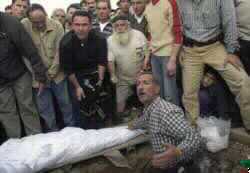Two Palestinians threw grenades Monday at an Israeli bus in the Gaza Strip and were shot dead by Israeli troops, and an Islamic Jihad activist was killed in an explosion in the West Bank - the latest incidents in escalating violence two weeks before Israel's election. In the Gaza incident, the two attackers charged the bus as it left the internationally illegal Jewish settlement of Netzarim, a senior occupation army officer said. Occupation troops opened fire, killing the assailants.
A pistol and six more grenades were found on the bodies, claimed the officer, who gave only his first name, Yoel. The Islamic Jihad claimed responsibility.
In a valley near Nablus, Islamic Jihad fugitive Raami Abu Bakr was killed and another activist, Fuad Ahmed, was wounded in an explosion. Ahmed said an Israeli missile hit them, but he could not say where it came from. The Israeli occupation said the two were trying to fire a shoulder-mounted missile at an occupation army fuel tanker, but it blew up.
Qureia Prevented From Travelling to Ramallah
Also Monday, the speaker of the Palestinian parliament, Ahmed Qureia, said Israel prevented him from traveling to the West Bank town of Ramallah to open a session of the legislature. He said he asked to cross two military checkpoints, but did not receive authorization.
Israel's Foreign Ministry said it was not aware of a specific request by Qureia, but the ban is in line with a decision by the Israeli Cabinet last week to restrict travel by Palestinian officials in response to a double resistance bombing in Tel Aviv that killed 23 people.
Palestinians To Take Part in London Conference By Telephone
The travel ban stymied British plans to host Palestinian officials for a conference on reform of the Palestinian Authority and options for peace with Israel, scheduled to open Tuesday in London. The Palestinians will now take part by telephone.
The Palestinian Authority on Monday released what it said was a summary of the presentation it would make to the London meeting, to be attended by representatives of the United States, the United Nations, the European Union, Russia and Arab countries.
The five-page document for the most part charted the course of the Palestinian-Israeli conflict and restated the Palestinian demand for Israel to withdraw from the West Bank, Gaza Strip and east Jerusalem to the positions it held before the 1967 Mideast war.
It said Palestinian reform could not be implemented until Israel loosened its military blockade of Palestinian towns and cities.
"The reform process cannot make additional long strides while the Israeli measures continue," it said.
Hamas Rejects Arafat's Call To Halt Attacks Before Israeli Elections
Hamas leader Sheik Ahmed Yassin on Monday rejected a call by Palestinian leader Yasser Arafat to halt attacks on Israeli civilians in the run-up to the Israeli election, and suggested his Islamic militant group might kidnap Israelis as ransom for Palestinian prisoners.
"Our enemies will free our prisoners only by force, because they only understand the language of force," Yassin said after a meeting with Hisham Abdel Razek, a Palestinian Cabinet minister in charge of Palestinian prisoners in Israel.
During the first Palestinian uprising, between 1987-1993, Hamas kidnapped several Israeli occupation soldiers to press for the release of Palestinian prisoners. No Palestinian prisoners were released in these cases, and Hamas killed its captives
PHOTO CAPTION
Family members and friends of Eli Bitton, 48, stand over his body during his burial in a cemetery near the Israeli northern village of Gadish on Monday, Jan. 13, 2003. (AP Photo/Eitan Hess-Ashkenazi)
- Author:
& News Agencies - Section:
WORLD HEADLINES


 Home
Home Discover Islam
Discover Islam Quran Recitations
Quran Recitations Lectures
Lectures
 Fatwa
Fatwa Articles
Articles Fiqh
Fiqh E-Books
E-Books Boys & Girls
Boys & Girls  Hajj Rulings
Hajj Rulings Hajj Fatwas
Hajj Fatwas














